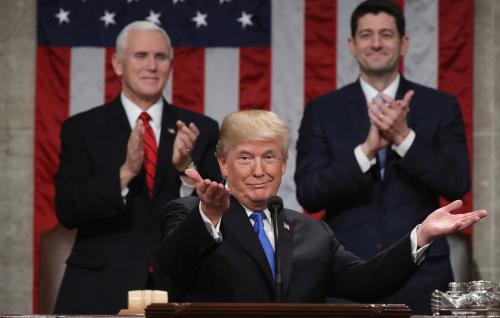In its budget proposal for 2004, the Bush administration seeks to increase funding for homeland security to just over $41 billion. That would roughly double federal spending compared with the period before 9/11. But it is still not enough.
The budget funds a large array of crucial homeland security efforts. However, it fails to address certain glaring vulnerabilities in this country. And it does not reflect a sufficient sense of urgency given the continued strength of al-Qaida together with the looming likelihood of war against Iraq.
President Bush’s budget still focuses too narrowly on preparing for “the last war”—that is, in defeating attacks with planes or anthrax or truck bombs. Should al-Qaida shift tactics, this budget would not do nearly enough to protect against other possible strikes. Nor does it adequately address the needs of first defenders and first responders on whom America’s safety ultimately depends.
The proposed budget is at least $5 billion below what is needed to fund activities that should be top priorities. These include more spending on information technology, greater expansions of agencies such as the Customs Service and work with the private sector to protect infrastructure such as skyscrapers and chemical facilities.
Above all, we need an immediate infusion of funds for state and local governments to meet their responsibilities for protecting Americans. Baltimore Mayor Martin O’Malley publicly has called for just that.
Consider information technology. We need better federal databases and the ability to link them with one another as well as with state, local and international partners—not only to keep track of suspected terrorists but to discover patterns of dangerous behavior.
But the White House last year froze spending for developing new systems or modernizing old ones. It now requests only about $300 million in added funds for information technology—roughly what a single large university might spend on computing technology in a year.
Or take the problem of container traffic into the country. The Customs Service last year created a program to screen containers at foreign ports before they are loaded onto ships. Yet, last year, the administration proposed no additional funding for this crucial initiative, and this year’s requested increase is minimal—even as Customs still cannot inspect more than 5 percent of all cargo entering the country.
The Bush administration also still trusts the private sector to protect its own assets. But the business of business is business, not homeland security. Private markets will often not adequately protect against terrorist attack on their own since individual businessmen typically worry more about making a profit than the extremely unlikely possibility that their property will be attacked.
Yet more than 80 percent of the critical infrastructure in this country is in private hands. It must be protected.
We need a public-private partnership in which government sets basic safety standards and requires private firms to carry some form of terrorism insurance. Insurance markets can then offer incentives for firms to take greater precautions against attack.
For example, the nation has more than 12,000 highly toxic chemical facilities. More than 100 store toxic chemicals that could, if released, endanger as many as a million people. None of these facilities is adequately protected against terrorist attack.
In June, the Environmental Protection Agency almost announced regulations to improve security at chemical facilities. But this effort was blocked by the White House for fear the EPA was exceeding its authority.
In Congress, Democratic Sen. Jon Corzine of New Jersey spearheaded an effort to pass legislation requiring chemical plants to identify vulnerabilities. The legislation was approved by a Senate committee but was resisted by industry groups and was not brought to a Senate vote. The administration has no new initiative to break this stalemate.
Then there’s the inexcusable problem of Washington failing to provide state and local governments with resources and intensified training to prevent and respond to possible future terrorist attacks.
Mr. Bush a year ago proposed grants of $3.5 billion for first responders, but Congress did not agree on an appropriations bill. Meanwhile, Mr. Bush vetoed the first installment that was included in a supplemental appropriations bill last year, preferring to make a token gesture of fiscal restraint rather than to protect the country. Funding remains tied up even today.
The president’s homeland security budget would be a reasonable effort if these were ordinary times. But they are not. War looms, and so does the threat of terrorism. Congress must hasten to plug those gaps in our defenses that the Bush administration has glaringly failed to fill.


Commentary
Op-edGaps in Our Defenses
February 12, 2003